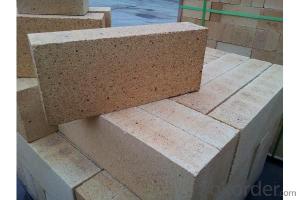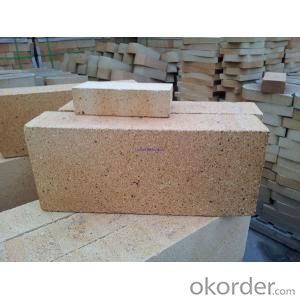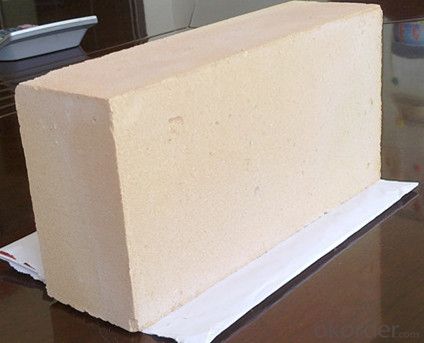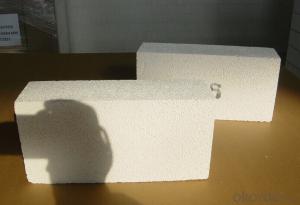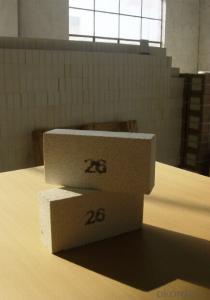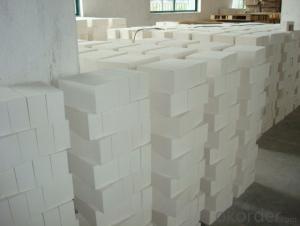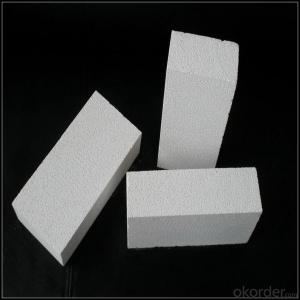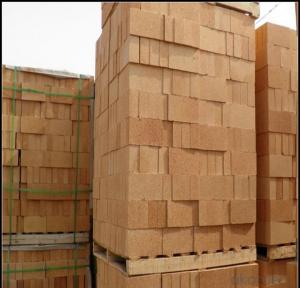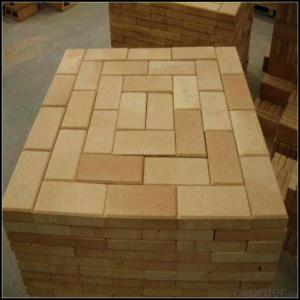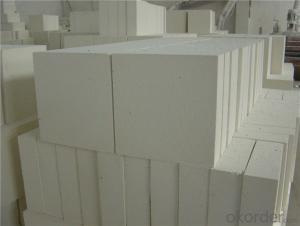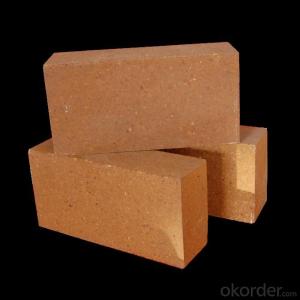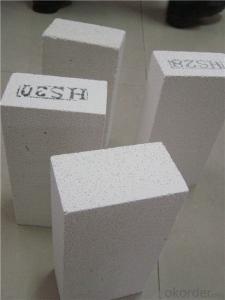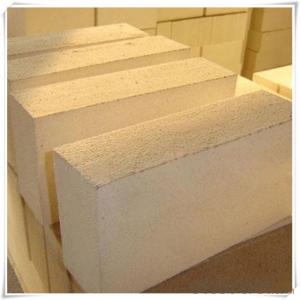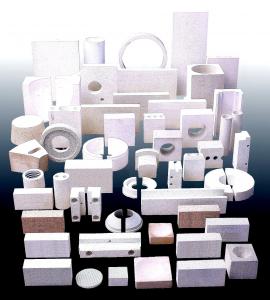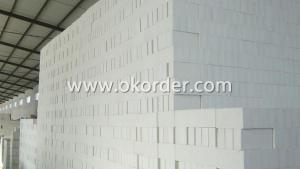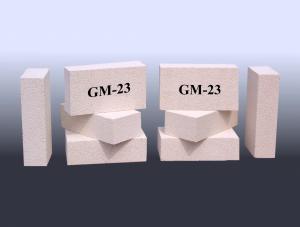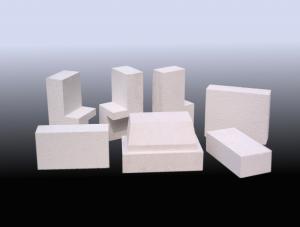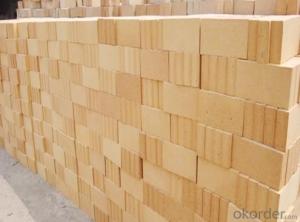Insulating Fire Brick for Blast Furnace and Industrial Kiln
- Loading Port:
- Tianjin
- Payment Terms:
- TT OR LC
- Min Order Qty:
- 20 m.t.
- Supply Capability:
- 10000 m.t./month
OKorder Service Pledge
OKorder Financial Service
You Might Also Like
CNBM conforms strictly to the requirements of ISO 9000 quality control system during the production. MSDS is also available if you want. The thermal insulation fire clay brick meet with the requirements of ASTM & JIS standards. So pls stay cool with our quality.
Insulating Fire Brick Technical index
Product No. | IFB70 | IFB60 | IFB50 | IFB40 |
Al2O3 | 68%-72% | 58%-62% | 48%-52% | 38%-40% |
Refractoriness (°C ) | ≥1790 | ≥1790 | ≥1790 | ≥1790 |
Bulk density (g/cm3) | 2.50-2.60 | 2.35-2.45 | 2.20-2.30 | 2.10-2.20 |
Apparent porosity (%) | 22 | 19-22 | 17-20 | 17-20 |
Cold Crushing strength (kg) | 480-510 | 450-480 | 430-450 | 390-430 |
Application
Insulating Fire Brick are used for the lining of converter, alternating current arc furnace, direct Current arc furnace and the ladle slag line, etc.
Equipment
1 unit of Ceramic Abrasive (SG Abrasive) pilot production line
2 units of Compact grain Abrasive pilot production lines
1 unit of high-end coated abrasives (abrasive cloth) production line
2 units of Boron Carbide production lines
3 large flexible crushing and sieving lines for grit production lines
2 units of 2000KVA furnaces for Boron Carbide fusion
6 units of 5000KVA-10000KVA dumping type electric arc furnaces for Brown Fused Alumina fusion
Company Advantage
(1)Long Insulating Fire Brick manufacture history: 25 years manufacturer
(2)Advanced equipment
(3)Diversification of production standards: ISO ANSI FEPA JIS ASTM
(4)Flexible payment: T/T L/C D/P D/A
(5)Professional marketing team and after-sale service
(6)Free sample
FAQs
Q1 |
What’s the transport method? |
A1 | FCL delivery goods with wooden pallet or wooden case by sea; If LCL delivery, must with wooden case; Sometimes need open top, flat rack or bulk cargo. |
Q2 |
What’s the required payment term? |
A2 | Generally 30% TT as the prepayment, 70% TT before delivery. If need, 100% Irrevocable Letter of Credit or negotiation. |
Q3 |
Which country are our products exported to? |
A3 | Apart from entire Chinese market, the US, Russia, Japan, Korea, Australia and some Southeast Asian Nations. |
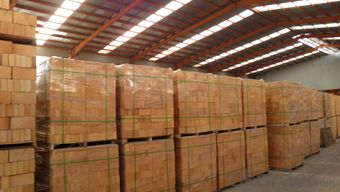
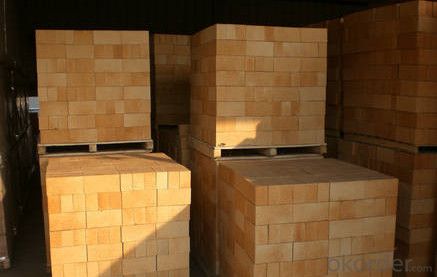
- Q: Can insulating fire bricks be used in refractory coatings?
- Yes, insulating fire bricks can be used in refractory coatings. They provide excellent thermal insulation properties and can help in maintaining high temperatures while minimizing heat loss.
- Q: Can insulating fire bricks be used in paper mills?
- Yes, insulating fire bricks can be used in paper mills. Insulating fire bricks are commonly used in industrial applications, including paper mills, to provide thermal insulation and protect equipment from high temperatures. They help in maintaining optimal temperature levels and enhance energy efficiency in the paper production process.
- Q: Are insulating fire bricks resistant to spalling?
- Insulating fire bricks exhibit resistance to spalling. These bricks are specially engineered to endure elevated temperatures and thermal shock, rendering them highly immune to spalling. Spalling indicates the fracturing and fracturing of bricks owing to exposure to extreme heat. Composed of superior refractory materials with low thermal conductivity, insulating fire bricks restrict heat transmission and diminish spalling hazards. Moreover, these bricks boast a remarkable melting point, rendering them excellently suited for applications demanding high temperatures. Consequently, insulating fire bricks find widespread application in furnaces, kilns, and other environments characterized by elevated temperatures, where spalling poses a significant concern.
- Q: Are insulating fire bricks resistant to thermal bridging?
- Yes, insulating fire bricks are resistant to thermal bridging. These bricks are designed to minimize heat transfer by reducing thermal conductivity, making them an effective solution for preventing thermal bridging in various applications.
- Q: Are insulating fire bricks resistant to oil and gas?
- Insulating fire bricks typically offer resistance against oil and gas. These bricks are crafted from high temperature materials like alumina and silica, which grant exceptional thermal insulation qualities and can endure elevated temperatures. They are commonly employed in industries where exposure to heat occurs, such as furnaces, kilns, and fireplaces. Nevertheless, it is crucial to acknowledge that the resistance to oil and gas can vary depending on the precise composition and manufacturing process of the insulating fire bricks. Certain bricks may exhibit higher resistance to oil and gas compared to others. To guarantee the utmost resistance to oil and gas, it is recommended to utilize insulating fire bricks that are specifically engineered for such applications. These bricks are often known as oil and gas resistant fire bricks and are formulated with supplementary additives or coatings that enhance their resistance to these substances. In conclusion, although insulating fire bricks generally offer resistance to oil and gas, it is advisable to employ bricks that are specifically tailored for such applications to ensure optimal performance and longevity.
- Q: Do insulating fire bricks provide sound insulation as well?
- Insulating fire bricks do not primarily offer sound insulation; instead, their main purpose is to provide thermal insulation. These bricks are specifically designed to endure high temperatures and are commonly utilized in kilns, furnaces, and fireplaces to prevent heat loss. Although they may offer limited sound absorption due to their density, they are not specifically engineered or efficient in reducing sound transmission. If the main concern is sound insulation, it would be more appropriate to consider alternative materials like acoustic insulation panels or soundproofing materials.
- Q: Are insulating fire bricks resistant to phosphoric acid?
- Insulating fire bricks are generally not resistant to phosphoric acid. Phosphoric acid is a strong acid that can react with and corrode many materials, including fire bricks. While some fire bricks may have a certain level of resistance to acidic environments, it is unlikely that insulating fire bricks would be able to withstand prolonged exposure to phosphoric acid without significant deterioration. It is therefore recommended to use acid-resistant materials, such as acid-resistant bricks or linings, when dealing with phosphoric acid or other strong acids.
- Q: Why does the water drop first and then rise when the boiler fires?
- Often in the operation of the boiler, the steam water mixture to the drum after intense evaporation of a large number of bubbles in the water side, the water volume expansion. By actual water level drum water level indicator is higher than the water level
- Q: What is the typical compressive strength of an insulating fire brick?
- The typical compressive strength of an insulating fire brick varies depending on the specific composition and manufacturing process. However, on average, insulating fire bricks have a compressive strength ranging from 1,000 pounds per square inch (psi) to 3,000 psi. These bricks are designed to withstand high temperatures and provide thermal insulation in various applications, such as kilns, furnaces, and fireplaces. The compressive strength is an important characteristic of insulating fire bricks as it determines their ability to resist crushing and maintain structural integrity under load.
- Q: Do insulating fire bricks require special storage conditions?
- Insulating fire bricks do not necessarily require special storage conditions, but it is recommended to store them in a dry, cool, and well-ventilated area. These bricks are made of lightweight materials that are designed to resist high temperatures and insulate heat. However, excessive moisture or exposure to extreme temperatures may affect their performance and durability. It is advisable to protect the bricks from direct sunlight or rain, as prolonged exposure to these elements might cause damage. Additionally, storing the bricks in an organized manner, away from sharp objects or heavy loads, can prevent any potential breakage or deformation. Overall, while special storage conditions may not be mandatory, taking proper precautions can help preserve the quality and longevity of the insulating fire bricks.
Send your message to us
Insulating Fire Brick for Blast Furnace and Industrial Kiln
- Loading Port:
- Tianjin
- Payment Terms:
- TT OR LC
- Min Order Qty:
- 20 m.t.
- Supply Capability:
- 10000 m.t./month
OKorder Service Pledge
OKorder Financial Service
Similar products
Hot products
Hot Searches
Related keywords
